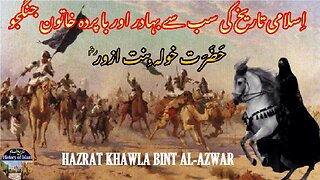Premium Only Content

Tareekh-e-Islam Episode-55-एपिसोड Conquest of Anbar अनबर की विजय فتح الاانبار
@islamichistory813 #conquestofanbar #battleofzatalayun #islamichistory #series #islamichistoryseries #Historical #Episodes #culturaljourneys #islamichistoryfacts #storiesofislamichistoryinurdu #stories #overview #adam #caliph #sultanselimI #prophetsofislam #caliphatehistory #foundation #islamicCivilization #journey, HistoricalIslamicFigures, #adam #sultans #islamictimeline #understanding #islamic #heritage #episode55
Conquest of Anbar or the Battle of Zat al-Ayun
Asslamoalaikum sisters, brothers, friends and elders, today in this informative series of Islamic History episode No. 55 of we will be describe, The Battle of al-Anbar, also known as the Conquest of Anbar or the Battle of Zat al-Ayun ("Battle of the Eyes"), was a pivotal military engagement that occurred in 633 CE between the forces of the nascent Islamic Caliphate, led by the esteemed general Khalid ibn al-Walid, and the Sasanian Empire. This confrontation took place in the city of Anbar, located approximately 80 miles west of the ancient city of Babylon, in present-day Iraq.
Following the decisive Muslim victory at the Battle of Ullais, Khalid ibn al-Walid set his sights on Anbar, a fortified city under Sasanian control. The city's defenses were formidable, characterized by strong walls and a moat, making a direct assault challenging. Recognizing the difficulty of a frontal attack, Khalid employed a strategic siege to compel the city's surrender.
A distinctive tactic utilized by Khalid during this siege was the deployment of a large contingent of archers. These archers were instructed to target the defenders stationed on the city walls, aiming specifically for their eyes. This relentless barrage resulted in numerous defenders being struck in the eyes, leading to the battle's epithet, "Zat al-Ayun," or "Battle of the Eyes." The sustained archery assault demoralized the Sasanian forces and significantly weakened their defensive capabilities.
The city's governor, Shirzad, witnessing the deteriorating situation and the effectiveness of the Muslim tactics, sought to negotiate terms of surrender. Khalid ibn al-Walid agreed to grant safe passage to Shirzad and his troops in exchange for the peaceful handover of Anbar. This agreement was honored, and the city fell into Muslim hands without further bloodshed.
The fall of Anbar had several significant implications. Strategically, it provided the Muslim forces with a crucial foothold in the region, facilitating subsequent campaigns into Sasanian territories. The victory also showcased Khalid ibn al-Walid's military acumen, particularly his ability to adapt tactics to the circumstances of the battlefield. Furthermore, the humane treatment of the surrendered forces and the city's inhabitants exemplified the ethical conduct promoted by the early Islamic military leadership, which often led to smoother integrations of conquered regions.
In the broader context of the early Islamic conquests, the Battle of al-Anbar demonstrated the effectiveness of combining psychological warfare with military strategy. The targeted use of archers not only inflicted physical harm but also served to intimidate and demoralize the enemy, leading to expedited surrenders and reduced casualties on both sides.
The legacy of the Battle of al-Anbar is reflected in its enduring mention in historical records as a testament to the strategic innovations and leadership qualities that characterized the early Islamic military expansions. The successful siege and subsequent control of Anbar paved the way for further advances into the heartland of the Sasanian Empire, contributing to the rapid expansion of the Islamic state during that era.
In conclusion, the Battle of al-Anbar, or the Battle of Zat al-Ayun, stands as a significant event in early Islamic military history. It highlights the combination of tactical ingenuity and ethical considerations that facilitated the swift and relatively humane expansion of the Islamic Caliphate. The conquest of Anbar not only underscored the military prowess of leaders like Khalid ibn al-Walid but also set precedents for the treatment of conquered peoples, influencing the conduct of subsequent military campaigns.
With this, we seek your permission until tomorrow. Allah Hafiz.
===================
-
 17:05
17:05
ISLAMIC HISTORY
3 days agoKhawla bint al-Azwar | The Veiled Warrior of Islam | خولہ بنت الازوار |اسلام کی باپردہ جنگجو
1 -
 LIVE
LIVE
FreshandFit
2 hours agoTyreek Hill Pays Ex Wife $1 Million in Ongoing Fees From Divorce?!
2,896 watching -
 2:03:46
2:03:46
Inverted World Live
4 hours agoHaunted Dolls Hack Amazon Alexa | Ep. 98
67.8K1 -
 LIVE
LIVE
Laura Loomer
4 hours agoEP140: Loomer EXPOSES Islamification At US State Department
1,084 watching -
 3:05:00
3:05:00
TimcastIRL
4 hours agoTrump Floats Accepting 600,000 Chinese Student Visas, MAGA Uproar | Timcast IRL
166K96 -
 8:44:47
8:44:47
SpartakusLIVE
9 hours ago$20,000 Hide and Seek Tourney w/ Stonemountain64 || #1 Rat wins the BIG CHEESE
49.3K -
 2:34:02
2:34:02
Barry Cunningham
5 hours agoLISA COOK | ADAM SCHIFF | LETITIA JAMES | ARE THEY BEING SACRIFICED BY THE DEEP STATE?
68.4K41 -
 1:36:19
1:36:19
Flyover Conservatives
13 hours agoOnly 17% of Millennials Hit These 5 Adult Milestones—Why?; What If Childhood Trauma Is Behind Your Health Problems? - Dr. Troy Spurrill | FOC Show
18.6K3 -
 4:49:04
4:49:04
HogansAlleyHero
15 hours ago💥CHASING DOPAMINE💥✅TRUMP SAYS BATTLEFIELD IS THE BEST✅
24.7K1 -
 1:57:40
1:57:40
MattMorseTV
5 hours ago $0.66 earned🔴Trump just SHATTERED the PROJECTIONS.🔴
42.1K31